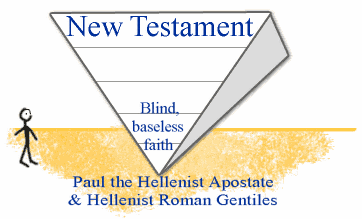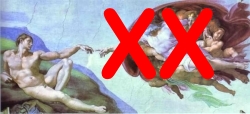
 |
| Torâh | Haphtârâh | Âmar Ribi Yᵊhoshua | Mᵊnorat ha-Maor |
|---|---|---|---|
Most Jews would never guess that pâ•râsh•at′ Shâvua No′akh (not the famous Yᵊsha•yâh′u 53) contains the two passages comprising the true linchpin of Christian doctrine, the sole load-point upon which the entire basis of Christianity, and Christian "salvation," rest like an inverted pyramid: mistranslation and perversion of bᵊ-Reish•it′ 15.5-6 & 13.15. Perverting these two passages, Christians falsely claim to argue from Tor•âh′ that the promises of the bᵊrit with Av•râ•hâm′ pass to Gentiles through the conduit of 'faith' rather than to Israel and the Jews through the conduit of – as Paul the Apostate went viral – the "curse of the 'law.'"
Before one can effectively apologize a polemic and its premises, it's essential to first understand the thrust of the argument. No one can handle that job better than an insistently inquisitive, Hampden DuBose Academy trained (during its zenith in '57-'58), Mensan and former Baptist preacher. How does Christianity argue from bᵊ-Reish•it′ 15.5-6 that the promises of the covenant with Abraham pass to Gentiles through the operation of (blind and ignorantly misunderstood) 'faith' rather than to Israel and the Jews through the operation of – as, again, Paul the Apostate put it – the "curse of the 'law'"? (Of course, "curse of the law" begs the question.)
 |
| Christianity (like Islam) depends on blind faith (not historical documentation and archeology like Tor• |
This load-point, which supports the entire basis of Christianity, was composed entirely by Paul the Apostate (Eusebius Eccl. Hist. III.xxvii.4), who had never met Rib′i Yᵊho•shu′a, and is thought to have been written around 51-57 C.E.—more than twenty years after the death of Rib′i Yᵊho•shu′a. However, the earliest evidence of almost all of Paul's supposed writings date from the 4th century, a quarter of a millennia later.
Supposedly (but invalidly) derived from Tor•âh′, Paul's argument was the founding cornerstone of the 4th century, Hellenist, proto-Christian movement that, beginning in 135 C.E., the Hellenist Romans devolved into Horus-like and Zeus-like Christianity and, in 333 C.E., was institutionalized by Constantine as the universal (i.e. catholic) Roman-Hellenist Christian Church. To both Hellenist Jews poorly informed in Tor•âh′ and Hellenist Roman gentiles, Paul's Hellenist reasoning, based directly on citations from a Hellenized corruption of Tor•âh′—more accurately LXX, seemed compelling.
The forces of the internet and other communications, coupled with assimilation, makes it impossible for Costume Jewry – Ultra-Orthodox, Kha•reid•
Understandings of Tor•
 |
Covenant given to Abraham by faith, not law—Gen. 15.5-6. Paul argues that because the covenant, and its promise, were given to Av•râ•
Children of Abraham confirmed principle of 'election by faith' (not law)—Gen. 25.23 ("The elder shall serve the younger"). "For the children being not yet born, neither having done any good or evil, that the purpose of God according to election might stand, not of works [i.e., keeping the "law"], but of him that calleth" ["according to election" = "faith"] (argued in NT VI Paul ["Romans"] 9.11-12).
"But the just shall live by faith"—Hab. 2.4 (argued in NT III Paul ["Galatians"] 3.11)
"Law is not faith" (argued in NT III Paul ["Galatians"] 3.12)
"For if the inheritance be of the 'law', it is no more of promise; but God gave it to Abraham by promise" (argued in NT III Paul ["Galatians"] 3.18)
"Not justified by the law" (since no one can keep it 100%; argued in NT III Paul ["Galatians"] 3.11)
"To Abraham and his seed sing. were the promises made—Gen. 13.15. He saith not, And to seeds, as of many; but of one, And to thy seed, sing. which is Christ." (argued in NT III Paul ["Galatians" 3.16), based on åÌìÀæÇøÀòÂêÈ
"Blessing of Abraham on Gentiles—based on Gen. 12.3—thru Jesus Christ; promise of Spirit through faith." "Blessing of Abraham might come on the Gentiles through Jesus Christ; that we might receive the promise of the Spirit through faith" (argued in NT III Paul ["Galatians"] 3.14)
Christ of faith fulfills this principle in Christianity: "I am come not to destroy but to fulfill" (argued from Hellenist (i.e., Greek) Christian Διαθηκη Καινη (NT) "Gospel of St. Matthew" 5.17. Contrast with The Nᵊtzârim Reconstruction of Hebrew Matitᵊyâhu (NHM, in English)![]() 5.17!
5.17!
Therefore "Christ hath redeemed us from the curse of the law" (argued from Διαθηκη Καινη (NT) III Letter of Apostate Paul ["Galatians"] 3.13)
 |
| Yᵊshiv• |
The non sequitur in this instance is Paul's assuming of the final clause: "not law" — which begs two questions (logical fallacy of petitio principii): [1] that
Therefore, the arguments of Paul the Apostate, being based on two petitio principii false premises, are ex falso quodlibet from the get-go!!!
Failure to deprive the Christian apologist of these two petitio principii (logical fallacies of begging the question) at this, initial, point, as a premise for further argument, creates the third, even more devastating, logical fallacy: the ex falso quodlibet.
The only other logical error that is equally devastating is the petitio principii of accepting the Christian Διαθηκη Καινη (Diathækæ Kainæ – they won't even know that's their New Testament) as an authority without first proving (not merely showing that there may be some possibility) its authority from
Accept either ex falso quodlibet and you cannot possibly win the argument you have already forfeited by these two fatal logical fallacies. If you allow the Christian to introduce these logical fallacies then you will have irreversibly sabotaged and destroyed your own positions and you will have precluded logical rebuttal, guaranteeing that the Christian's logical fallacies – which you bunglingly accepted – will prevail. For 2,000 years, this has been the typical outcome. You must immediately recognize, and disallow, every false premise from the get-go.
First, Tor•âh′ literally means "instruction"; Tor•âh′ is "Life's Instruction Manual," not "law." (The word most accurately meaning "law" is ãÌÄéï – as in áÌÅéú ãÌÄéï.) Secondly, the final clause is not only non sequitur but petitio principii as well, begging the question that "faith" is mutually exclusive from, and contradictory to, Tor•âh′ – again, both are false premises.
In fact, the exact opposite is the case. àÁîåÌðÈä is an intrinsic element of Tor•âh′ – but àÁîåÌðÈä in things that are compatible with Tor•âh′, not anything that displaces (i.e., contradicts) Tor•âh′ (prohibited by Dᵊvâr•
 |
| Michelangelo 'Creation of Adam' Sistine Chapel fresco |
Paul argues that because the covenant, and its promise, were given to Av•râ•
Unlike Michelangelo and Medieval European goy•Zeus (or pre-existent Jesus) "floated" a complete physical
Tor•
 |
Einstein's rebuke of an atheist is consistently ignored by atheists:
"Try and penetrate with our limited means the secrets of nature and you will find that, behind all the discernible concatenations, there remains something subtle, intangible and inexplicable. Veneration for this force beyond anything that we can comprehend is my religion. To that extent I am, in point of fact, religious." – Albert Einstein
Rabbinic tradition correctly insists that Tor•
Thus, completely shattering Paul's premise and consequent exegesis, Tor•
Moreover, as shown in last week's pâ•râsh•
The Scripture under scrutiny, instead of corroborating Paul's premise, corroborates the conventional rabbinic tradition that
Thus, Paul's premise is demonstrated false!!!
This phrase is the fulcrum upon which Paul's, and hence all of subsequent Christianity's, faith-claims pivot.
åÀøÇá
éÇòÂáÉã
öÈòÄéø
(…, but the rav (great) shall serve the junior.") — the
translation into Aramaic enlightens modern researchers how this phrase was understood by Tor•
åÀøÇáÌÈà
éÄùÑÀúÌÇòÂáÇã
ìÄæÀòÅéøÈà
(…, but the senior shall be subjugated to the junior) — the
The Hellenist perspective differs, due more to their idolatrous cultural fabric, which determined the meaning that Hellenists brought to, and correspondingly took away from, the passage, rather than in the quite similar LXX translation to which Paul related:
και ο μειζων δουλευσει τω ελασσονι (…, but the greater shall slave for the lesser).
 |
Even internally, strictly within Judaism, misunderstanding of this phrase has caused immeasurable damage, inspiring elitism, supremacism and racism. Consequently, this phrase should perhaps better be interpreted as "…, but the rav (rabbi) shall be subjugated to the untitled" — bringing the rabbis of Costume Jewry (Ultra-Orthodox Kha•reid•
Such "Jewish" exegesis of this phrase has also caused immeasurable bad blood, with consequent immeasurable spilling of blood, among both Jews and Arabs, as a result of the recurrent attitude among many Jews, including some Ultra-Orthodox (and even some Orthodox) Jews inspired by the "Arabs are to serve Jews by Biblical Authority" interpretation of entitlement that many Jews derive from this phrase under study. This has also fueled the "chosen" (to rule over Arabs and goy•
It's imperative that Orthodox Jews disown and condemn such "entitlement to rule" "chosen"-ness attitudes.
 |
Even though the Διαθηκη Καινη (NT) is invalid for doctrine (Dᵊvâr•
Therefore, the burden of proof rests solely on Paul, and Christianity, to logically prove that
Regarding the 1st century C.E. Jewish views on preselection (underpinning Paul's argument of "faith" trumping works of keeping Tor•
"Now for the [pᵊrush•
imꞋ ], they say that some actions, but not all, are the work of fate, and some of them are in our own power, and that they are liable to fate, but are not caused by fate [emphasis added]. But the sect of the Essens affirm, that fate governs all things, and that nothing befalls men but what is according to its determination. And for the [Hellenist-Tzᵊdoq•imꞋ ], they take away fate, and say there is no such thing, and that the events of human affairs are not at its disposal…" (Josephus, Ant. xiii, v, 9; see also Antiq. xviii, i, 2-6 and Wars ii, viii, 11-14).
Paul clearly leaned heavily beyond and outside of the pᵊrush•
Beyond all of this, the burden of proof to defend Paul's impossible exegesis rests squarely, immovably and solely on the Christian. Until then, his exegesis remains invalid — a false premise which may not be floated to support any polemic or apology.
 |
Truism – if you allowed the false equivalence {
Not even a school child should make this logical error. The bᵊrit ("promise") is an intrinsic element of Tor•
This is a silly argument. Wherever you live, you are not justified by the law. So can you ignore the law, do whatever you wish and tell the judge he'll have to accept your actions of "faith"? (You'll be reading this from jail, or death row – or hell.)
It is true that no one is justified by the "law." But it is not true that no one is justified by Tor•
This argument, that "seed" must be understood only as singular, demonstrates how Paul wrests phrases out of their context, directly and intractably contradicting the very next verse in Tor•
"Then I will put æÇøÀòÂêÈ like the dust of hâ-
ÂrꞋ ëtz, which, if a man is able ìÄîÀðåÉú the dust of hâ-ÂrꞋ ëtz, æÇøÀòÂêÈ also éÄîÈÌðäÆ." (13.16)
It is crystal clear from the passage, as well as from all of the Sages, that the singular "seed" not only refers to Yi•
Paul's premise – that the singular "seed" cannot refer to plural descendants – is directly contradicted by the very next verse! Furthermore, by authority of Dᵊvâr•god, Jesus.
Yet again, Paul's premise is false.
No, the "faith" aspect has already been thoroughly debunked, disproven and demonstrated false. (To reiterate, ëm•un•
"2 Then I will make you a big goy, åÇàÂáÈøÆëÀêÈ, and I will make your name big; åÆäÀéÅä áÌÀøÈëÈä.
3 åÇàÂáÈøÀëÈä îÀáÈøÂëÆéêÈ, and [those] who are cursing you m.s. I will damn. åÀðÄáÀøÀëåÌ áÀÌêÈ all of the families of ha-a•dâm•âhꞋ "
 448x297.jpg) |
| áÌÄøÀëÌÇú äÇëÉÌäÇðÄéí áÌÇëÌÉúÆì |
This passage is about blessing those who bless Av•râ•
Because this verse stipulates that the families of ha-a•dâm•
The blessing promised by
 |
| Christianity (like Islam) depends on blind faith (not historical documentation and archeology like Tor• |
While the provision of ki•pur′ is granted only to those who do their utmost to keep Tor•âh′, Tor•âh′ also stipulates that ki•pur′ is granted only when that àÁîåÌðÈä is exclusively in the khein (not christ, nor even messiah nor mâ•Jesus)!!! The passage upon which all of Christian "faith" – the Διαθηκη Καινη (NT) , its doctrines, all of Christian claims and the entire religion of Christianity – supposedly rests, the load point of the inverted pyramid, turns out to be an apostasy authored by Paul the Apostate(who, BTW, authored most of the Διαθηκη Καινη (NT)), not
With the Διαθηκη Καινη (NT) invalidated as doctrinal authority there is no longer a "therefore"!!! Only endless ex falso quodlibets.
Tor•âh′ and àÁîåÌðÈä are inextricably interwoven and interdependent. It's blasphemous how Christians imagine they can rip Yi•sᵊr•â•eil′ apart from the "Ël•oh•im′ of Yi•sᵊr•â•eil′" by claiming that "God" has rejected "the Jews" and become the "god" of the gentiles.
There is another, more subtle, deception in the Christian redaction. A promise is a unilateral gift with no strings. The subtle and deceptive shift from "bᵊrit" in the original language to "promise" in Christian doctrine is precisely where Christianity perverts Tor•âh′ to introduce its gentile Roman Hellenist innovation of no strings "salvation." As emphasized in last week's study, a bᵊrit is a legal contract. The original language sets forth a bᵊrit, in Tor•âh′ and defined by Tor•âh′—not a naked promise (and especially not as distorted over two millennia later by an excised apostate champion of Hellenism, Paul; cf. Eusebius, EH III.xxvii.4)! One must be extremely careful that paraphrasing doesn't result in error, deception and straying from Tor•âh′.
Clearly, the only way you can be certain to avoid such deceptions is to relate directly to the original language of Tor•âh′—yourself.
The idea of Mâ•shi′akh wasn't conceived until millennia after Av•râ•hâm′; while the Hellenist counterfeit man-god idol tracks back – separately – through Hellenist Zeus back to the Egyptian Horus. The idea that Av•râ•hâm′ had "faith" in "christ" is an absurdly laughable Christian fantasy. In English, the original-language meaning is more unambiguously—"faithfully"—communicated: "And Av•râ•hâm′ hë•ëmin in
Children of Av•râ•hâm′ confirmed the principle of 'election by hë•ëmin in Tor•âh′' according to the original language of bᵊ-Reish•it′ 25.23; NOT gentile Hellenist Christianity— The children of Av•râ•hâm′ were Yi•tzᵊkhâq′ Âv•i′nu and Yi•shᵊm•â•eil′ (not "Christ"). Tor•âh′ informs that Yi•shᵊm•â•eil′ was rejected because he was born, physically, of a woman from outside of the physical family of Av•râ•hâm′! This is further refined in clarified in the sons of Yi•tzᵊkhâq′ Âv•i′nu when Ei•sau′ is rejected because he intermarries outside of the physical family of Av•râ•hâm′. These are two of many initial building blocks that developed over centuries into Tor•âh′. Christianity, by contrast, has no real connection even to first-century Tor•âh′, much less to the beginnings of Tor•âh′ around B.C.E. 2100!
"The Tza•diq′ shall live in his àÁîåÌðÈä"—Khavaquq 2.4 Further, öãé÷ áàîåðúå éçéä (tzadiq bë-ëmunâto yikhᵊyëh; the tza•diq′ in his àÁîåÌðÈä shall live).Khavaquq 2.4. Tza•diq′ is defined by Tor•âh′ as Intractably contradicting the argument of Paul and Christianity, Tor•âh′ does NOT say that the Tor•âh′-rejector or wilfull transgressor of Tor•âh′ shall live in his antinomian "faith." Exactly the opposite, Khavaquq stipulates that one who is tza•diq′ as defined by Tor•âh′ shall obtain eternal life through his àÁîåÌðÈä: Tor•âh′ study and training.
Paul's argument that "Law is not faith" is true in mistranslated Greek and English. However, the fallacy, and exact opposite meaning, becomes conspicuous when the original language of Tor•âh′ is more accurately represented: "àÁîåÌðÈä is an intrinsic element of Tor•âh′"! Doing one's utmost to keep Tor•âh′ necessarily and inescapably entails àÁîåÌðÈä. It is then apparent that "the inheritance" can only be the product of the bᵊrit if "the inheritance" is of Tor•âh′ in which àÁîåÌðÈä is encapsulated.
 |
| Stone Edition |
Like most arguments, many Christian arguments begin with an element of truth before duping its followers into non-sequiturs and other logical fallacies. It is true that "man is not justified by the law." Man cannot even be justified by his or her keeping of Tor•âh′ (which is vastly different from the Hellenist and Christian conceptions of "the law"), since no man can be perfect. Christians labor under the misconception that, despite citations declaring that all have sinned and everyone's good works are no better than a cloak of ornaments (Yᵊsha•god) for that. But here's the bad news for Christians:
"To Abraham and his seed were the promises made—bᵊ-Reish•it′ 13.15. Christians make much of the fact that åÌìÀæÇøÀòÂêÈ refers to "seed" in the singular. Of course it's singular! The context makes it certain that the "seed"—singular—is Yi•tzᵊkhâq′ Âv•i′nu as opposed to Yi•shᵊ
12.3 (& 28.14) – "Bᵊrâkh•âh′ of Av•râ•hâm′ on
ëÉÌì
îÄùÑÀôÌÀçÉú
äÈàÂãÈîÈä
… promise of the Spirit through àÁîåÌðÈä in
Exactly the opposite. Specifically, áÌÀøÈëÈä derives from the root áÌÈøÇêÀ, conveying submission. Thus, it is only those families of ha-a•dâm•
"Blessed" in "become blessed" necessarily is the same meaning as "blessed" in Av•râ•hâm′ "being blessed"—receiving the submission of "families of ha-a•dâm•
Even according to the earliest extant Church historian (Eusebius, E.H., III, xxvii, 2-6), the Hellenist (Greek) NT is NOT authoritative. According to the only account accepted by Rib′i Yᵊho•shu′a's immediate followers, Hebrew Ma•tit•yâh′u, what Rib′i Yᵊho•shu′a actually said was: "Don't think that I came to uproot the Tor•âh′ or the Nᵊviy•im′; but, rather, I came to reconcile them with the Oral Law of ë•mët′." (NHM![]() 5.17)—the polar opposite of the Christian misrepresentation.
5.17)—the polar opposite of the Christian misrepresentation.
Therefore, it is the doing of one's utmost to keep the bᵊrit—Tor•âh′ (Christian "redemption" and "salvation" concepts weren't even conceived—syncretized from Greek and Egyptian paganism—until after 135 C.E.); and relying on the ki•pur′ of
Christians, preaching that their NT has superseded (displaced) Tor•âh′, and Muslims, preaching that their Quran is authority instead of Tor•âh′, both willfully transgress Tor•âh′, leaving them both disqualified from ki•pur′ and a corresponding place in hâ-ol•âm′ ha-ba′. Man's only Way to walk with
 |
The Artscroll commentary asserts for pâ•suq′ 17.15 that ùøé (Sarai) means "My princess." That is an error. The "é" (ai) ending is the plural masc. possessive, "My nobles or princes."
"My princess," in Hebrew, would be ùøúé (Sarahti); and "My princesses" would be ùøúé (Sarahtai).
As the father of such a daughter myself, I can understand how her father could regard her as more than all of the male princes and nobles any son or sons might have become. To her father, she excelled all of those. In this pâ•suq′, Ël•oh•im′ changes her name to ùøä (Sarah; noblewoman or princess), noting that, in addition to being regarded as a noblewoman and princess in her own right, she would also produce nobles or princes, founding a dynasty.
 |
15:8-18 — Many justly regard this as one of the most, if not the most, enigmatic passages in the Bible.
Ancient peoples considered that when they ate their qor•bân•ot′ they absorbed the characteristics that they had imputed to their qor•bân•ot′. They considered some qor•bân•ot′ to be the vehicle for bearing away their a•veir•ot′ of Tor•âh′ (literally "up in smoke"), after which they (or the Kohan•im′, for very holy qor•bân•ot′) consumed the vehicle that had been rendered holy, ingesting that holiness themselves.
Conversely, at least as early as the first century C.E., in addition to the primary aveir•âh′ of Tor•âh′ (i.e., assimilation) from eating together with pagans, a major step in socializing and assimilation, religious Jews equated eating meat over which a blessing to an idol had been recited to ingesting demons and unholy spirits that emanated from that idol into the meat. Hellenist Jews called such contaminated meat ειδωλοθυτον (idolothuton; "idol-blessed," translated into the English NT as "meat offered to idols"). Today it is called "gentiles' meat" or "meat of the gentiles," and superstitious Jews fear getting demons, and unholy evil spirits if they eat meat that is not kâ•
 |
| Socializing: Office Xmas Party |
Acculturation and assimilation – which is the true ingesting of demons and unholy evil spirits – are the real problems with eating meat over which a blessing has been recited to the Christian idol. While modern science doesn't support the notion of ingesting demons or unholy spirits contained in food, the primary problem—assimilation with pagans by eating and socializing together with them—remains. Further, one mustn't support pagan ritualistic beliefs in demons and unholy spirits—most particularly, unholy spirits (defined by Tor•âh′ as every spirit that advocates the abandonment of Tor•âh′) that they call "holy." This is all in addition to the complementary prohibitions concerning ka•shᵊr•ut′.
For two parties to eat together, then, demonstrated agreement on a number of issues. Beyond that, this was a time long before personal written contracts became pervasive. Written contracts were rare, and limited almost exclusively to royalty. In those times, one's word was his contract; his reputation, his very life. A man was his word, for good or evil. Recall the many tragedies that ensued from a careless vow. When two parties instituted a serious bᵊrit, they would impute the terms of the bᵊrit to qor•bân•ot′, which they would then divide. The divided qor•bân•ot′ represented the purified—holy—terms of the bᵊrit, apportioned to each party. Each party to the bᵊrit would then walk between the divided qor•bân•ot′, inspecting and acknowledging the spirits (i.e. the terms of the bᵊrit) of the qor•bân•ot′, and then eat the qor•bân•ot′, ingesting those spirits (terms of the bᵊrit). In this way, they made the holy bᵊrit and its spirit and terms an integral part of themselves.
It is interesting, then, that Av•
Re-reading pâ•suq′ 9, we find that
But
However, there is a simple solution that accords with Tor•âh′; though many modern Jews will find it an anathema and prefer the heresy. Both the úÇðÌåÌø òÈùÑÈï and the ìÇôÌÄéã àÅùÑ are unmistakable allusions to the ember of Zᵊkhar•yâh′ Bën-Bë•rëkh•yâh′ Bën-Id•o′ ha-Nâ•vi′ 12.6 & 3.2, which describes the – dual-roled – Mâ•shi′akh.
(The opinion of Rashi, that the passage describes Yᵊho•shu′a Bën-Nun, and not the Mâ•shi′akh, standing in the heavenly court conversing with god idol of the Christian Church. Similarly, there is no dual role associated with Yᵊho•shu′a Bën-Nun while the dual roles of Mashiakh Bën-Yo•seiph′ and Mâ•shi′akh Bën-Dâ•wid′ are well attested and documented among the Sages, in Tal•mud′ and in Judaic literature.)
Moreover, the symbolism of the dual parties to the bᵊrit in this pâ•râsh•âh′, the úÇðÌåÌø òÈùÑÈï and the ìÇôÌÄéã àÅùÑ, perfectly represents the two roles of the Mâ•shi′akh. The úÇðÌåÌø òÈùÑÈï describes the controversial (oven = hot) and partially enigmatic (symbolized by smoke) role of Rib′i Yᵊho•shu′a as Mashiakh Bën-Yo•seiph′ described, too, by the first half of the aphiqoman Matz•âh′ (in the pës′akh Sei′dër), while the ìÇôÌÄéã àÅùÑ symbolizes the role of Rib′i Yᵊho•shu′a as Mâ•shi′akh Bën-Dâ•wid′ illuminating the world with Tor•âh′ through the legacy of his teachings restored by his original Nᵊtzâr•im′.
 |
The validity of the NT cannot be defended without resort to circular reasoning. There is no transition from pre-135 C.E. Tor•âh′-teaching of Rib′i Yᵊho•shu′a and his Nᵊtzâr•im′ Jewish followers to post-135 C.E. Christianity or the NT. Too often, people simply take the word of their parents or their religious cleric – a 'holy-man'.
Consider two scenarios.
Consider the person to whom you look for spiritual advice and religious authority; whom do you quote in your discussions with others, and
When discussing Scriptures with others, whom do they quote for religious authority?
Jewish readers often look to their rabbi or, often, quote a medieval rabbi. Non-Jewish readers generally look to their pastor, a priest, an evangelist, or perhaps a religious author, seminarian or, in the majority of cases, the NT.
 |
| 'holy-man' – ignorant egoist deceiver |
With our very diverse readership, addressing this topic requires a more universal and inclusive term to avoid repeatedly having to list all of the supposedly 'holy-men' in the above paragraph. There doesn't seem to be a shared term. So, let's define some generic 'holy-man' to include all of these 'holy-men', whether used individually or collectively.
"Born Jew" Christians are no more Tor•
When discussing Scripture with someone, how many times have you encountered, or perhaps even yourself resorted to, the reply, "Does 'holy-man' agree with that?" "Has 'holy-man' endorsed your book?" "What does 'holy-man' say?" I have to ask 'holy-man' first whether I can read that." "But 'holy-man' says…"
What has happened to the person's free will, conferred upon him by
 |
Who says any such phonies are a 'holy-man' at all??? Is it not Tor•âh′ that defines holiness? Must you not make that determination yourself, by thinking for yourself with your own free will? What, if not an unholy spirit, is responsible for self-perpetuating intermediaries who displace a person's Tor•âh′-ordained free will with a herd instinct to enhance their own influence, power and prestige – the definition of a cult?
Unthinkingly—literally, people tend to put their faith in 'holy-man' instead of in
 |
 |
This ôøùä begins
åÇéÌÉàîÆø
17:12-13 — Here, áÌÀðÅé-ðÅëÈø–the phrase properly denoting "gentiles"–who desire to interact with the Jewish community are required to be circumcised and convert to Ya•had•
The effect of this mi•tzᵊw•âh′ is that, when circumstances permit, the offspring born to geir•im′ must convert and become Yᵊhud•im′ rather than creating an ever increasing population of òÅøÆá øÇá (of geir•im′). Ideally, only those first-generation geir•im′ who cannot qualify to convert should remain geir•im′. Children born to geir•im′ after they've become attached to the Jewish community should,
Again by halakhic extension, children born to geir•im′ before they became attached to the Jewish community fall into two categories: those above the age of áø/áú îöåä who must make their own choice as to which religion to follow, and those below the age of áø/áú îöåä who should be circumcised (for boys) and converted.
To do any less for the children would severely penalize them when they reach the age of marriage. geir•im′ cannot take a spouse from the Jewish community and would be apostate to intermarry back into the goy•im′ community.
If the descendants of geir•im′ were also geir•im′, then an ever growing population of geir•im′ would eventually outnumber Yi•sᵊr•â•eil′ proper. The tail would eventually wag the dog, injecting contra-Judaic influences and assimilation, corrupting Ya•had•
17:25 — éÄùÑÀîÈòÅàì was circumcised at age 13. Arav•im′ (Arabs), more popularly áÌÀðÅé-ãåÉãÄéí (benei-dod•im′; sons of uncles, i.e., cousins in Hebrew), still circumcise their boys at age 13. We notice that, like Ya•a•
In urging the Christian world to reconcile to the authentic, halakhic, teachings of Ribi Yᵊho•shu′a whom they aspire to follow, which requires abandoning the polar-opposite Roman counterfeit, the Nᵊtzâr•im′ are uniquely positioned to heal the associated problems of assimilation, intermarriage and misojudaism.
We can, and shall, also position ourselves to reconcile conflicts between a significant segment of Islam and Ya•had•Jesus as the divine son of god, removing a great obstacle. More importantly, Muslims are our cousins. Unlike Christians, our cousins are legitimate heirs to the brit with Av•râ•hâm′. Even more importantly, again unlike Christians, Muslims pray to the same Eil, (Arabic Allah), that we do. Moreover, again unlike Christians, Muslims are zealous in their adherence to a hadith (tradition) of religious laws paralleling, and often overlapping, Ha•lâkh•âh′. Yᵊhud•
We postulate that much of the conflict between Yᵊhud•
 |
| ÷ÆáÆø Yo•seiphꞋ, ha-Tza•diqꞋ, 2000.10.07 – destroyed and desecrated by Muslim Arab Jihadist "Palestinians" of Arab-occupied |
| ÷ÆáÆø Yo•seiphꞋ, ha-Tza•diqꞋ, burned–again (2015.10.16)–by Muslim Arab Jihadists. And world still learns nothing. |
We must be realistic. There are areas in which we're certainly going to disagree. Since some fundamentalists of all three religions refuse to learn anything that contradicts their 'holy-man', some differences will, for them, remain irreconcilable. While I can see parity in some elements of Av•râ•hâm′, Yi•shᵊ
Yet, recognizing that we worship the same Eil-Allah permits us to worship side by side with our áðé-ãåãéí, something we could never do with Christians and other goy•im′. Compromise on the Me'arat ha-Makhpeilah in Khevron, Yᵊrushâlayim, and Har ha-Ba′yit is impossible with the goy•im′, probably impossible with secular Aravi governments—and, from all indications, probably unworkable with secular Yisraeili governments.
Nevertheless, it appears to us that there are possible solutions between religious Yᵊhud•
Extremist-reaction against secular influences has created violent fringe elements in both communities. We hope that in both religious communities there are larger elements desiring to bring Islam and Ya•had•
There are also certain areas of disagreement in which we can disagree without being disagreeable. An example will provide a paradigm for such instances. Islam flatly prohibits drinking-alcohol while wine is an integral part of Ya•had•
It would seem an obtainable goal that while in the presence of our áðé-ãåãéí we could accommodate them by leaving our wine at home or in the Beit ha-Kᵊnës′ët. When we visit them in Aravi communities or mosques it should be without drinking-alcohol. It seems reasonable that Arav•im′ could accommodate Yᵊhud•
Between the areas of agreement between Ha•lâkh•âh′ and hadith, and the areas that seem reconcilable between Ha•lâkh•âh′ and hadith, we hope that there can be more agreement than disagreement, and that remaining areas of disagreement can be handled in an atmosphere of mutual respect. With time—through mutual commitment to the overriding authority of logic and scientific pursuit of truth and historical documentation—perhaps even the remaining areas of disagreement will become reconcilable. There is, after all, only one true history, implying that there is only one truth that reflects true history. Science, logic and documentation constitute the path to that truth.
We intend to devote a greater focus in this area, and hope soon to publish a positional paper The Nᵊtzâr•im′ On: Islam , preferably in collaboration with like-minded Muslim clerics. This column will form the nucleus of the paper. [Note: such Muslim cleric has never materialized.]
We ask Ken [and others] to place this section [including the date originally published in our old newsletter] in the Islamic forums of the Internet and America online computer networks, inviting religious Muslims who share similar hopes to reply to me here in Yi•sᵊr•â•eil′ via the blogback form in our Web Café. We'll probably generate some hostile responses, perhaps in both communities, but then we should be accustomed to that by now.
Our objective, making the Nᵊtzâr•im′ the intersecting point reconciling the three major religions, would please Eil / Allah and His Mashiakh Ribi Yᵊho•shu′a. (It would not be proper for us to include that it would please Mohammed. Just as Muslims do not speak for Ribi Yᵊho•shu′a, so Yᵊhud•
 |
17.5 — "As to the meaning of [Av•
17.15 — Scholars have had difficulty harmonizing bᵊ-Reish•it′ 11.31, which identifies Sarai as the daughter-in-law of Terakh with bᵊ-Reish•it′ 20.12 in which Av•râ•hâm′ states that "she is my sister; she is the daughter of my father [Terakh] but not the daughter of my mother'" The only way she could have been the daughter-in-law of Terakh, the same father as Av•râ•hâm′, would have been to marry one of Av•
In order to marry Av•
Sarai is linked by some scholars to the Akkadian Sarrat, one of the designations of the moon-godess Ishtar." ("Sarah," EJ, 14.867). We should not be shocked by this. Av•
Ishtar is the godess of Easter. The following is the note from the Introduction of NHM![]() : The Akkadian
: The Akkadian Ishtar parallels Ashtoret, the godess of love and fertility of Sidon, Lebanon ("Ashtoreth," EJ, 3.738). Ashtoret is associated with the evening and morning star ("Ashtoreth," ibid.) which also corresponds to Ishtar and the Mesopotamian Venus—both the morning and evening star ("Sabea," EJ, 14.588). Ashtoret "is the preeminent godess in [Ta•na"kh′], and the plural Ashtarot is a generic term for godesses, used together with bᵊal•im′ as a collective term for pagan worship" (cf. Sho•phᵊt•im′ 2.13; 10.6; Shᵊm•u•eil′ Âl′ëph 7.3,4; 12.10; Mᵊlâkhim Âlëph 11.5; Mᵊlakh•im′ Beit 11.13; "Ashtoreth," ibid.). "She is most probably the 'Queen of Heaven,' for whom the women of Yᵊhud•âh′ kneaded cakes, libated, and burned incense in order to assure fertility and plenty ([Yi•rᵊmᵊyâh′u] 44.17-19f. [Yi•rᵊmᵊyâh′u] 7.18)" ("Ashtoreth," ibid.).
 "Ad-lo-yada" (until he didn't know) Purim Parade in Ra•anana. Nothing like the pagan festival, elementary schools parade down the main street, Akhuzah, of Ra•anana , stopping the parade periodically for the various classes, often dressed in various costumes, to perform long-rehearsed dances in the street. (Although "ad lo yada" originally referred to drinking in celebration "until he didn't know," I've never seen anyone drinking, much less drunk, during "Ad lo yada.") Photograph © 1998 by Yirmeyahu Bën-David. |
 Purim in Israel, Yael as Marge Simpson. Photograph © 2000 by Yirmeyahu Bën-Dawid. |
The names of Mardekhai and Ës•teir′ derive from the Babylonian deities Marduk and Ishtar. In LXX, the name of the Purim festival is seen to parallel the Persian festival for Ishtar—Fevardigan ("Scroll of Esther," EJ, 14.1052). Also in this story is seen "the elevation of Ishtar-Ës•teir′ over the Elamite godess Mashti-Vashti" ("Scroll of Esther," ibid.). This elevation was probably equated with the vernal equinox which the Ishtar festival approximated. In this Ishtar festival we have Easter (corruption of Ishtar) centuries before the birth of Ribi Yᵊho•shu′a. Ës•teir′ was the name given to her by the Babylonians, not her given name. Her given name was Hadasah (myrtle).
ùøä (Sarah) is the feminine form of ùø (sar; minister—as a head of government such as Foreign Minister and the like) for which there is no English counterpart (perhaps "ministress.")
 |
![]()
Those who rely upon any 'holy-man'—rabbi, priest, imam, guru, et al.—are doomed to be consternated by the inexorable corrosion of their fragile belief system by the hard evidence of unassailable logic, indisputable facts and undeniable historical documentation. Contrary to the popular global-socialists' perversion of relativism, truth isn't relative (e.g., death of victim at the hands of a terrorist attacker does not equal death of the terrorist attacker killed in self-defense), it is a binary absolute: true or false—for everyone alike. The Creator-Singularity of the universe,
åÀ÷åÉéÅ é‑‑ä—not trusters in any 'holy-man' cleric (rabbi, priest, imam or guru)—éÇçÂìÄéôåÌ ëÉçÇ; i.e., shall be infused with the Power of His RuꞋakh ha-QoꞋdësh.
 |
![]()
In the Nᵊtzâr•im′, as in classic
Let me be clear: Nᵊtzâr•im′ follow Tor•âh′ according to Ha•lâkh•âh′ as determined by the Beit Din ha-Nᵊtzâr•im′ and according to the teachings of Rib′i Yᵊho•shu′a the Mâ•shi′akh documented in NHM![]() —not Yi•rᵊmᵊyâh′u Bën-David per se. He who would follow Tor•âh′ follows Tor•âh′, not a 'holy-man'. When I—or anyone else, not necessarily 'holy-man'—can present compelling logic, documented historical facts and the like, then this evidence stands on its own merit. It isn't compelling merely because Yi•rᵊmᵊyâh′u Bën-David—or any other 'holy-man'—said it.
—not Yi•rᵊmᵊyâh′u Bën-David per se. He who would follow Tor•âh′ follows Tor•âh′, not a 'holy-man'. When I—or anyone else, not necessarily 'holy-man'—can present compelling logic, documented historical facts and the like, then this evidence stands on its own merit. It isn't compelling merely because Yi•rᵊmᵊyâh′u Bën-David—or any other 'holy-man'—said it.
This is central to this week's pâ•râsh•âh′. It's axiomatic that a perfect Tor•âh′ doesn't include things which have no business being in it. Therefore, the commentators have speculated the reason for the addition of the seemingly unnecessary ìê (le•kha; you[rself]) modifying ìê (lekh; you go!). Why didn't Tor•âh′ just read simply ìê (lekh; you go!)? Why was it necessary to add ìê (le•kha; to / for you[rself])?
 |
We find Av•
We find the similar usage of the trailing ìê in Dᵊvâr•im′ 2.13 where Israel is alone among idolaters in the wilderness with no peers to help her follow Tor•âh′, and
ìÆêÀ ìÀêÈ is found again at the A•qeid•âh′ (bᵊ-Reish•it′ 22.2), where
Are you getting the picture?
It is from the confines of peer pressures and "holy-men" that the Nᵊtzâr•im′ challenge the modern thinking and educated individual, Jew or non-Jew, to break free. The Nᵊtzâr•im′ have broken that mold.
If you've wondered why we don't feature promotional endorsements and testimonials about our books from "holy-men" who've read them, now you know. You study, apply logic and decide for yourself. !ìÆêÀ ìÀêÈ Don't trust in 'holy-man'. Most of Orthodox Judaism accepts these principles, so we're not by ourselves or out on any limb. But if your trust is in the endorsements of "holy-men," whether individually or consensus, instead of directly in Tor•âh′ then you've unknowingly surrendered—lost—your free will to a cult, from which your free will / soul must be redeemed or neither we nor our books are for you anyway. So endorsements would encourage you in the wrong direction and short-circuit the process you must work through' yourself. If 'holy-man' loves our books it will help him. It won't rub off on you. You cannot follow
I'm neither the only, nor the first, to recognize the supreme authority of Logic being an element of the Omni-Scient. Ramb"m also recognized that logic carries the same authority as Tor•âh′ shë-bi•khᵊtâv′: "ãÄÌéðÄéí
ùÑÆçÄéãÀùÑåÌ
òÇì-ôÌÄé
ñÀáÈøÈà" (Laws that they renovated [must be] according to logic).![]() "Laws derived through logic. A compelling logical inference has the status of a written law."
"Laws derived through logic. A compelling logical inference has the status of a written law."![]() Contrary to rabbinic claptrap equating logic to tradition (contradicting ñÀáÈøÈà), the only authentic logic, of course, is mathematically precise logic, not foolishness and unfounded assertions often peddled as 'logic' by anti-science, anti-logic and anti-history, Dark Ages European-assimilated, Ultra-Orthodox (Kha•reid•imꞋ) rabbis and amateur "classical" philosophers, who have no grasp of science, math or logic.
Contrary to rabbinic claptrap equating logic to tradition (contradicting ñÀáÈøÈà), the only authentic logic, of course, is mathematically precise logic, not foolishness and unfounded assertions often peddled as 'logic' by anti-science, anti-logic and anti-history, Dark Ages European-assimilated, Ultra-Orthodox (Kha•reid•imꞋ) rabbis and amateur "classical" philosophers, who have no grasp of science, math or logic.
Unless there's compelling logic in what 'holy-man' says, the opinion of 'holy-man' counts for nothing. Even then, it is only the compelling logic, not the endorsement of 'holy-man', which has merit. Unlike the greatest rabbis, it is those who most lack compelling logic for authority who must rely most upon quoting great names for authority. (All scholars, including rabbis, give credit to those who developed an idea or argument. That's not quoting them for authority, like mindless puppets.) Tor•âh′, not peers, is your Light and Guide.
Mosh•ëh′'s successor, Yᵊho•shu′a Bën-Nun, understood this well when he addressed Israel with decisiveness and commitment which I echo to challenge you this day: Yᵊho•shu′a 24.15!
!ìÆêÀ ìÀêÈ
 |
| Tor•âh′ | Translation | Mid•râsh′ Rib′i Yᵊho•shu′a: NHM |
NHM |
||||||||||
|---|---|---|---|---|---|---|---|---|---|---|---|---|---|
| |||||||||||||
| |||||||||||||
 |
![]()
Tzᵊdâq•âh′ plays also in this ol•âm′, to nullify every edict, and also from the shadow of death itself; and particularly from a strange death. As it is memorized in Tal•mud′, chapter Qama of Rosh ha-Shanah (16.2): •mar′ Rab′i Yitzkhaq Avinu, Four things cancel an edict of man's law, and these are they:
Tzᵊdâq•âh′, as it is written: "And tzᵊdâq•âh′ will rescue from death" (Mi•shᵊl•ei′ Shᵊlom•oh′ 10.2).
A shout, as it is written: "And they shouted to
A change of sheim, as it is written: "And Ël•oh•im′ said [to Av•râ•hâm′], Sarai, your woman, you shall not call her name Sarai, for Sarah is her name (bᵊ-Reish•it′ 17.15). And it is written: "And I have blessed you, and also I have given her a son for you" (17.16).
A change of Ma•as•ëh′, as it is written: "And the Ël•oh•im′ saw their Ma•as•ëh′, that they returned from their wrongful ways" (Yon•âh′ 3.10).
And there is a saying, Even a change of place, as it is written: "And
And He honored [this]: "And I will make you a big goy" (ibid., 12.1). Another [interpretation]? Perhaps he [thereby] merited the land of Israel, it became his right.
And it has also been memorized in Pirqâ Qamâ Dᵊvarâ (4.1), •mar′ Rav Yᵊhud•âh′, •mar′ Rav, "For what was Dâniyeil punished? Because he initiated counsel for Nᵊvu-khadnëtzar." As it is written, "Nevertheless, O king, let my counsel be pleasing to you: Break-off your kheit•im′ by tzᵊdâq•âh′ and your perversions by khein toward the impoverished; perhaps then your tranquility will be extended" (Dâniyeil 4.24). As it is written, "All [of this] came upon Nᵊvu-khadnëtzar, the king. At the end of 12 months he walked in the palace of the kingdom of Bavël" (ibid. 25-26). [This] teaches that His decree was extended one year by tzᵊdâq•âh′—then all the more so if there was a return in tᵊshuv•âh′. And if this is found among the goy•im′, who much more so in Yi•sᵊr•â•eil′, that nullifies the decree all in all. We learn that the tzᵊdâq•âh′ nullifies the decree.
Also, we find that deliverance from death is a power from which a work of Binyâmin ha-tza•diq′. As it is told in the opening chapter of Ma•sëk′ët Bâv•â′ Bat•râ′ (11a), They said about him, concerning Binyâmin ha-tza•diq′, that he was in charge over the money box of tzᵊdâq•âh′. Once a woman came and stood before him in the second [year of a] drought. She said to him, "Rab′i, subsistence." He said to her, "By work, there is nothing in the tzᵊdâq•âh′ money box." She said to him, "Rab′i, if you don't provide subsistence, behold, a woman and seven of her children will die of starvation." Binyâmin ha-Tza•diq′ stood and provided her subsistence of his own [money]. Subsequently [lit. "toward days"], he became ill and tended toward death. The Malakhei ha-Shâreit [ministering, attendant] before ha-Qâ•dosh′, Bâ•rukh′ Hu, said, "Ribono shel ol•âm′ (Sovereign-Lord of ol•âm′), You have said, 'Everyone preserving one nëph′ësh of Yi•sᵊr•â•eil′ is as if he had preserved the entire ol•âm′'—and Binyâmin ha-tza•diq′ preserved a woman and seven children; [but] he would [obviously] die in a very few years. It is taught: they added 22 years to him.
It has been memorized in bᵊ-Reishit Rab•âh′, the No′akh chapter (49a), Rab′i Mei•ir went to this [place]. He saw [a group of] melancholy people [lit. "heads"]. He said to them, "Are you, perhaps, from the family of áðé òìé (Bᵊnei Eili; the sons of Eili), as it is written, 'All those who attain majority in your house shall be dying men.' " (Shᵊm•u•eil′ Âl′ëph 2.33)? They said to him, "Pray for us." He said to them, "Care for them with tzᵊdâq•âh′ and they shall become Zᵊqan•im′" as it is written, "A crownlet-wreath of splendor is elderliness, it is found in the Way of tzᵊdâq•âh′" (Mi•shᵊl•ei′ Shᵊlom•oh′ 16.31).
And it is memorized in chapter Ma•sëk′ët Bâv•â′ Qam•â′ (10a), it was saying, Ten difficult Dᵊvâr•im′ were created in the ol•âm′.
the difficulty of a mountain: cutting out iron,
the difficulty of iron: bubbling up from a fire,
the difficulty of fire: extinguishing with water,
the difficulty of water: carrying by thick clouds,
the difficulty of clouds: carrying by the Ru′akh from their dispersed [directions],
the difficulty of Ru′akh: carrying by a body,
the difficulty of a body: fearing breaking,
the difficulty of fear: numbing of wine,
the difficulty of wine, overseeing sleep
the difficulty of sleep: ceasing [caused by] death,
the difficulty of death: ceasing of tzᵊdâq•âh′.
As it is written, "And tzᵊdâq•âh′ shall rescue from death" (Mi•shᵊl•ei′ Shᵊlom•oh′ 10.2).
Rescue from strange death as well, as it has been memorized in Ma•sëk′ët Shab•ât′ at the end of the chapter "He Who Obscures [or causes darkness]" (156b), of Shᵊmueil and [astrologer-sage] Avlat, who were seated, supervising-it to-he-who [is] men to bring herbs. •mar′ Avlat to Shᵊmueil, This noble-minded man went and but didn't come back. He was bitten by a snake and died. •mar′ Shᵊmueil to him, If from Yi•sᵊr•â•eil′ he went and came, meanwhile he is going and coming. Avlat arose
We have learned that tzᵊdâq•âh′ rescues the âdâm from everything râ.
![]()
(Translated so far)
 |
 |